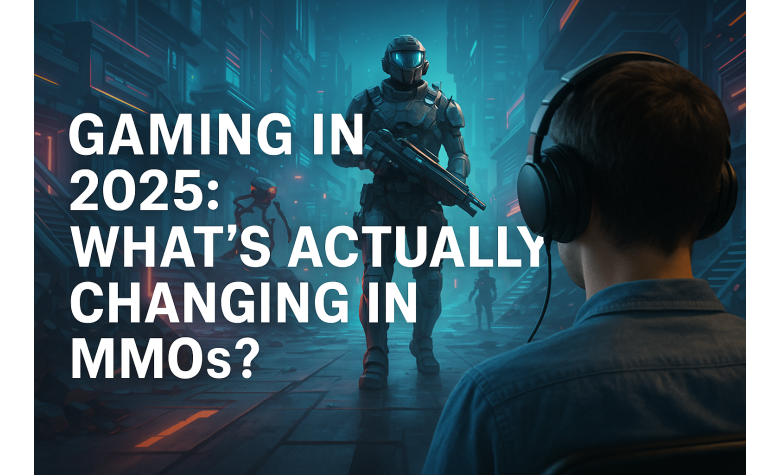Gaming in 2025: What’s Actually Changing in MMOs?

MMOs haven’t disappeared. They’ve just changed in ways you might not have noticed, if, that is, you’ve been out of the loop. The genre used to be all about big raids, global chat arguments, and staying up until 3 A.M. to kill a world boss.
Don’t get us wrong, that version still exists, but it’s no longer the centre of the MMO universe. In 2025, these games are becoming more social, more flexible, and more focused on what players do between the fights.
That’s probably the most important thing: Players aren’t just logging in for combat anymore. They’re logging in to hang out.
In a lot of guilds now, people jump between games as a group. They’ll do a raid in one MMO, switch to something chill like a survival sandbox, grab a snack, and then maybe close the night in Discord watching one of their friends try to win money in an online casino. This comparison for August 2025 shows just how popular that final activity has become, especially with platforms offering some of the best payout rates in years.
You see, it’s become normal for gaming sessions to bleed into other digital spaces like that. And MMOs are starting to reflect this shift.
Worlds That Aren’t Just Stages
The days of static maps are fading. Some modern MMOs track supply chains, weather patterns, and even political tension between regions. If a faction pushes a little too far, that can affect the economy or change how NPCs treat players. And players actually genuinely notice these things, because they’re really happening around them, not in a cutscene.
Fighting’s Not the Only Way to Matter
In older MMOs, if you didn’t want to fight, your options were shamefully limited. Well, maybe you could fish. Maybe.
Now? Now, people build careers inside MMOs that have nothing to do with killing things. Some become traders and work the auction house for real influence. Others design furniture, run in-game delivery services, or even take commissions for writing lore or hosting events. These roles have support from the game itself, not just from other players.
What’s good about this is that it brings in new people to play. You don’t need to enjoy raiding or PvP to have a reason to log in. And the ones who do still raid benefit from having an economy and social world that feels alive.
Players Are Building the Content Now
This one’s been coming for a while. More MMOs are releasing tools that let players design and publish their own stuff. Dungeons. Buildings. Event zones. Entire quests. Some of it’s rough. Some of it’s better than what the developers make. But it works.
And it keeps us engaged. You don’t have to wait for the next expansion; there’s always some kind of player-made chaos to dive right into.
It also means MMOs are becoming that bit more personalised. You see, one server might be full of player-run cities and arenas, but then another focuses on survival mechanics and scarcity. Same game, different experiences, basically.
Mobile Isn’t an Afterthought
Five years ago, saying “this MMO works on mobile” was basically the same as saying “this MMO has been watered down.” Not anymore.
Now, most of the top MMOs are playable across devices. Same character, same world, same systems. You can mine materials on your lunch break or jump into voice chat from your tablet. The games are adapting to your schedule instead of demanding you adapt to theirs.
And no one’s mocking mobile players like they used to. Everyone’s playing from everywhere.
Social First, Game Second
This might annoy the purists amongst us out there, but it’s legit: A lot of MMO time now is social. Not just in chat, but in what people actually do with their time in-game.
Some of us log in to build houses. Others amongst us decorate shops, trade, play minigames, or just idle while talking. A few years ago, that might have looked like wasting time. Now it’s the core loop for a decent chunk of the player base.
Developers are leaning into it. Voice chat tools are built-in, social spaces are bigger and easier to customise, and players can run events without needing to beg a GM for permission. There are systems to reward community building - not just beating people up in combat.
And while that might sound soft compared to dungeon crawling, it keeps many people playing. Which is kind of the whole point.
The Genre’s Not Dead. It Just Grew Up.
For all the talk about MMOs being past their prime - they’re not, because they’re still evolving. The core hasn’t changed much (think progression, community, world-building), but the way players interact with those three things has. They want choice and flexibility. They want to feel like their time matters, and it doesn’t matter whether they’re slaying dragons or running a tavern.
In 2025, MMOs aren’t trying to be everything for everyone. They’re trying to be good places to stay for a while. Places you can log into, not because you have to, but because your friends are already there, waiting. And maybe that sense of community is what matters the most.